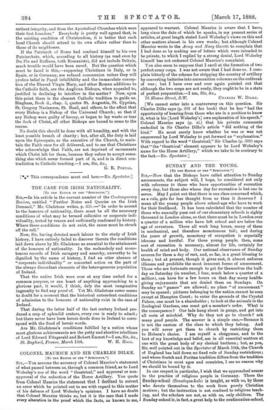THE CASE FOR IRISH NATIONALITY.
rro THE EDITOR OF THE " SPECTATOR." J SEE,—In his article in the current number of the Contemporary _Review, entitled "Further Notes and Queries on the Irish Demand," Mr. Gladstone writes, p. 335 :—" In order to ascend to the honours of nationality, there must be all the necessary conditions of what may be termed collective or corporate indi- viduality, tested by reason and sufficiently confirmed by history. Where these conditions do not exist, the cause must be struck off the roll."
Now, Sir, having devoted much labour to the study of Irish history, I have entirely failed to discover therein the conditions laid down above by Mr. Gladstone as essential to the attainment of the honours of nationality. In the melancholy and mono- tonous records of Irish savagery and anarchy, unworthy to be dignified by the name of history, I find an utter absence of "corporate individuality" or concerted action on the part of the always discordant elements of the heterogeneous population of Ireland.
That the native Irish were ever at any time united for a common purpose, or can boast of anything approaching to a glorious past, it would, I think, defy the most imaginative ingenuity to find any proof of. Yet Mr. Gladstone never seems to doubt for a moment that the historical antecedent conditions of admission to the honours of nationality exist in the case of Ireland.
That during the latter half of the last century Ireland pro- duced a crop of splendid orators, every one is ready to admit ; but there never have been heroic deeds done in Ireland to corre- spond with the flood of heroic words.
Are Mr. Gladstone's conditions fulfilled by a nation whose most glorious achievements are the petty and abortive rebellions of Lord Edward Fitzgerald and Robert Emmet F—I am, Sir, &c.,
St. Raphael, France, March 13th. W. H. HALL.


































 Previous page
Previous page